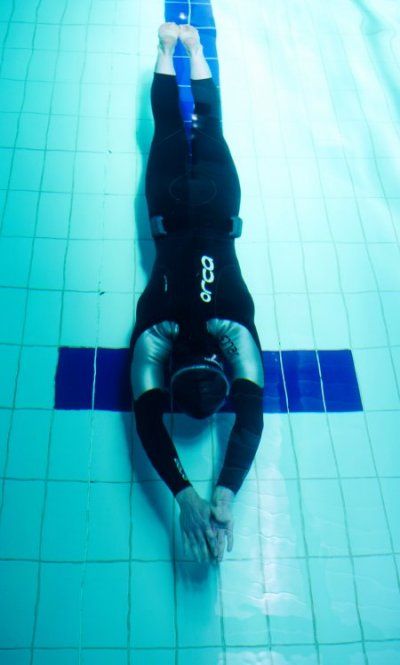DNF (Dynamic NO fins)
Kathryn McPhee discusses her new training techniques that are taking her to the top of Dynamic No Fins.
Over about the last year I have learned a new and effective way of training that suits me and my competitive freediving goals. I do short, intense sessions mainly focussing on perfecting technique. In the past I have suffered from over-training from doing challenging fitness sessions that I did not really enjoy. Now I generally start my session with a maximum attempt and follow this up with technique work. The important thing to remember when training like this is that if I start pulling out of dives I need to go back to more fitness work or I will not get enough out of my training sessions. I am also lucky to have a very reliable buddy with whom I regularly practise our safety procedures so we are both well prepared should a blackout occur.
I feel it is very important for competitive freedivers to regularly simulate what they would do in competition so it is second nature. We have in the past spent a lot of time training but not focussing on the goal at the end - leaving the max attempt as a secondary part of training, as it is too psychologically challenging. I feel that the only way to overcome this is to do a lot of them. That is not to say that in competition you will not feel nerves, but it will no longer be related to whether or not you can actually achieve the goal or not. For me, the max attempt is the most important part of both my fitness and technique training. It forces me to perfect every part of my dive: preparation, inhale, starts, buoyancy, arm strokes, kicks, streamlining, turns, maintaining a consistent pace, retaining the power of the stroke, dealing with discomfort, general mental relaxation, keeping focus until the end, surfacing and surface protocol.

I mainly train dynamic without fins (DNF) as this is my most enjoyable and strongest event. In preparation for a long dive in training I would normally do a full body stretching routine that lasts ten to fifteen minutes. Then I change into my wetsuit which allows me a few minutes to relax again. I basically then just hop in the water and go. I like to do a quick visualisation of my dive, thinking through the entire dive and focusing on any areas that have been troubling me. I stand in the water while visualising as this allows me to take a few minutes to relax again right before the dive. I do not do any hyperventilation or forced breathing prior to my dives. I just take the one big breath.
Diving without a warm up makes the contractions start earlier, but the increased ‘trauma’ of not allowing your body to slowly adapt to being in the water and holding your breath in general, brings on the mammalian dive reflex earlier. My contractions normally start at around 40m into the dive but without warm ups they are fewer, less intense and easier to control. Normally by about 70m the dive reflex has kicked in and the dive becomes enjoyable again. I have learned to mentally push away contractions by doing a lot of dry, negative breath-holds which are fairly painful but teach me how my mind can stay in control well after my body has told me to give up and nowadays I do not really suffer from them. The beauty of no warm up dives is the mental lucidity at the end of the dive. I am totally in control, reminding myself about keeping my technique together and retaining my focus. My eyes are open in a relaxed state, I am totally aware of my surroundings but I am not thinking about the distance covered. This is one of the issues I have had with reaching world record standard. I have to forget about the distance and thinking about how far it is in relation to what other people are capable of. It has to be entirely about how I feel, if I am able to continue or if it is time to surface.
Every day is different and I accept that consistency is difficult to achieve as a freediver. Little things from what I eat the night before, to how much sleep I am managing, through to the amount of stress I am dealing with at work, my hydration levels and how much I pushed my training the day before can make a large difference in my results. I generally have a minimum goal that I like to achieve with my maximum attempts in training which is the distance or time that I feel I should be able to accomplish even on the worst day. However, it really does not matter how I go as long as I have pushed myself to a reasonable level to where I learn something new from the dive. I am very goal driven and generally I find that I do not pull out of dives, especially when I am working towards a specific competition.
The final benefit of completing a lot of maximum attempt dives is that it is easy to gauge my progress. I can easily quantify the improvements and they are a lot more regular than they have been in the past.
Kathryn McPhee



